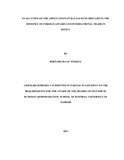| dc.description.abstract | With an increasingly enlightened and empowered citizenry, the demand on Public
Service Organizations to deliver quality services in a cost effective way has never been
more pronounced in Kenya than now. Despite most public Sector Organizations
developing glossy Strategic Plans, this has not been matched by performance in the,
especially in the management of public resources and the delivery of services which is
partly attributable to lack of effective strategic Management tools. One of the more
popular tools is the Balanced Score Card. This study set out to evaluate the application of
the Balanced Scorecard in the Kenyan public Sector. Specifically, the study sought to
examine the extent to which the Ministry of Foreign Affairs & International Trade
applies the four perspectives of the BSC in its strategic planning and the impact this has
on its performance as well as the challenges. Chapter one presents the background of the
study and discusses the concept of Balanced Score Card, performance management in
Kenya and an overview of the Ministry of Foreign Affairs and International Trade where
the research is undertaken. The chapter also sets out the research problem, research
objective and outlines the value of the study. Chapter two present both the theoretical and
empirical literature. The theoretical foundation of the study discusses the Resource Based
Theory and the Stakeholder Theory while the empirical literature focuses on the origins
and evolution of the Balanced Scorecard, the Balanced Scorecard perspectives,
challenges in the implementation of the Balanced Scorecard and the research gap.
Chapter three presents the methodology adopted by the study. The study adopted a case
study research design targeting desk officers in charge of Performance Contracting within
departments, directorates and units at the Ministry of Foreign Affairs and International
Trade. The data was collected using an interview guide and analyzed using content
analysis. The study concluded that though the BSC offers a lot of potential for effecting
strategic planning, monitoring and evaluation, the Ministry has not optimized assess its
strategic planning and generate results that translate into actionable policies. The Ministry
of Foreign Affairs and International Trade has been moderately successful in evaluating
of customers perspectives, internal processes, learning and growth and financial
performance. The study recommends improved understanding of the balanced scorecard
across all organizational units, full support of executive on implementation of BSC, more
education and training on BSC, adequate IT support, adequate personnel responsible for
implantation of BSC, implementation of BSC across all organizational units, employee
commitment to performance evaluation. | en_US |

